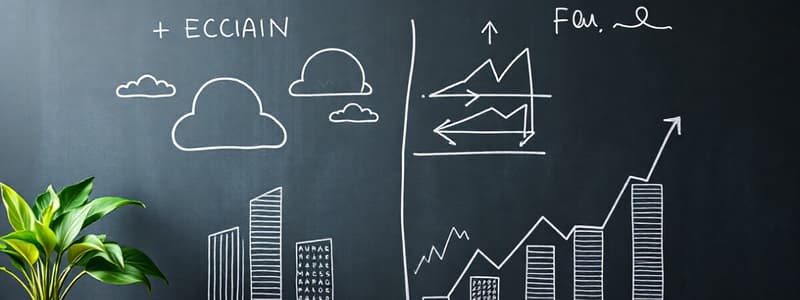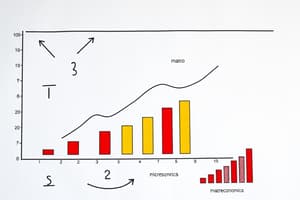Podcast
Questions and Answers
Which of the following scenarios best exemplifies the core concept of 'scarce resources' within the scope of economics?
Which of the following scenarios best exemplifies the core concept of 'scarce resources' within the scope of economics?
- A company develops a new and highly efficient manufacturing process, reducing production costs significantly.
- A firm invests in research and development to create a groundbreaking new product.
- A consumer faces a limited budget and must prioritize which goods and services to purchase. (correct)
- A government implements a policy to redistribute wealth from the wealthy to the poor.
Imagine a scenario where an individual is trying to decide between purchasing a new car or investing in a retirement fund. Which branch of economics would primarily focus on analyzing this individual's decision-making process?
Imagine a scenario where an individual is trying to decide between purchasing a new car or investing in a retirement fund. Which branch of economics would primarily focus on analyzing this individual's decision-making process?
- Macroeconomics
- Normative economics
- Microeconomics (correct)
- Positive economics
What is the fundamental difference between positive and normative economics?
What is the fundamental difference between positive and normative economics?
- Positive economics focuses on predicting the future, while normative economics deals with past events.
- Positive economics analyzes the effectiveness of policies, while normative economics assesses their ethical implications.
- Positive economics describes economic phenomena objectively, while normative economics prescribes what should be done. (correct)
- Positive economics focuses on individual decisions, while normative economics examines broader economic trends.
Which of the following statements aligns with the principles of 'optimization' in economic decision-making?
Which of the following statements aligns with the principles of 'optimization' in economic decision-making?
How does the availability of 'given information' influence the choices made by economic agents?
How does the availability of 'given information' influence the choices made by economic agents?
Which of the following topics would be considered a subject of study within macroeconomics?
Which of the following topics would be considered a subject of study within macroeconomics?
What is the most accurate way to characterize the relationship between microeconomics and macroeconomics?
What is the most accurate way to characterize the relationship between microeconomics and macroeconomics?
Which of the following is NOT an example of a normative economic statement?
Which of the following is NOT an example of a normative economic statement?
Consider a scenario where a government is designing a new policy to encourage investment in green technologies. Which of the following questions would fall under the scope of normative economics?
Consider a scenario where a government is designing a new policy to encourage investment in green technologies. Which of the following questions would fall under the scope of normative economics?
Which of the following best describes the underlying principle of 'optimization' in economic decision-making, as applied to the decision of a consumer choosing between two competing products?
Which of the following best describes the underlying principle of 'optimization' in economic decision-making, as applied to the decision of a consumer choosing between two competing products?
In the context of the free-rider problem, why would a shared flat with 6 people experience a more significant issue compared to a flat with 2 people?
In the context of the free-rider problem, why would a shared flat with 6 people experience a more significant issue compared to a flat with 2 people?
Which of the following does NOT directly contribute to the cost of commuting to an apartment?
Which of the following does NOT directly contribute to the cost of commuting to an apartment?
What is the primary difference between causation and correlation?
What is the primary difference between causation and correlation?
In the context of cost-benefit analysis, how does the concept of opportunity cost apply to the decision to attend a specific course?
In the context of cost-benefit analysis, how does the concept of opportunity cost apply to the decision to attend a specific course?
In the scenario of the free-rider problem illustrated by the shared flat, what condition indicates that the flat is NOT in equilibrium?
In the scenario of the free-rider problem illustrated by the shared flat, what condition indicates that the flat is NOT in equilibrium?
Consider the example of buying a laptop in a store 100km away. According to the text, what is the relevant cost-benefit analysis when comparing the choice of buying the laptop in the more distant store?
Consider the example of buying a laptop in a store 100km away. According to the text, what is the relevant cost-benefit analysis when comparing the choice of buying the laptop in the more distant store?
What is the main purpose of a scientific model in the context of economic analysis?
What is the main purpose of a scientific model in the context of economic analysis?
How does the concept of optimization in differences apply to choosing between two different apartments?
How does the concept of optimization in differences apply to choosing between two different apartments?
Which of the following scenarios represents a negative correlation?
Which of the following scenarios represents a negative correlation?
The text argues that "changing the available information at the time of the decision can change the optimal choice." What is the most important factor in making an optimal decision in the context of changing information?
The text argues that "changing the available information at the time of the decision can change the optimal choice." What is the most important factor in making an optimal decision in the context of changing information?
Flashcards
Economic Agents
Economic Agents
Individuals or groups that make economic choices.
Scarce Resources
Scarce Resources
Goods that are limited and cannot satisfy all wants.
Positive Economics
Positive Economics
Analyses what economic agents actually do, based on facts.
Normative Economics
Normative Economics
Signup and view all the flashcards
Microeconomics
Microeconomics
Signup and view all the flashcards
Macroeconomics
Macroeconomics
Signup and view all the flashcards
Optimization Principle
Optimization Principle
Signup and view all the flashcards
Meaning of 'Given Information'
Meaning of 'Given Information'
Signup and view all the flashcards
Labor Market Composition
Labor Market Composition
Signup and view all the flashcards
Public Policies in Normative Economics
Public Policies in Normative Economics
Signup and view all the flashcards
Trade-offs
Trade-offs
Signup and view all the flashcards
Opportunity Cost
Opportunity Cost
Signup and view all the flashcards
Budget Constraint
Budget Constraint
Signup and view all the flashcards
Cost-Benefit Analysis
Cost-Benefit Analysis
Signup and view all the flashcards
Equilibrium
Equilibrium
Signup and view all the flashcards
Empiricism
Empiricism
Signup and view all the flashcards
Causation vs. Correlation
Causation vs. Correlation
Signup and view all the flashcards
Marginal Analysis
Marginal Analysis
Signup and view all the flashcards
Free-rider Problem
Free-rider Problem
Signup and view all the flashcards
Optimization
Optimization
Signup and view all the flashcards
Study Notes
Scope of Economics
- Economics analyzes how agents make decisions with limited resources and how these choices impact society.
- Choices, not money, are central to economic study.
- Economic agents encompass any decision-making entity (consumers, firms, governments). They typically aim for optimal outcomes.
- Scarce resources are goods in insufficient supply to meet everyone's needs.
Branches of Economics
- Positive economics describes observed economic behavior objectively.
- Focuses on explaining and predicting, without value judgments.
- Examples: Average wages in sectors, gender income gaps (causes, determinants).
- Normative economics prescribes what economic agents should do.
- Involves subjective judgments.
- Results in policy recommendations.
- Examples: Best job offers, optimal public policies to reduce gaps.
Microeconomics and Macroeconomics
- Microeconomics examines individual agents' choices and their impact on prices, resource allocation, and well-being.
- Examines a part of the economy.
- Examples: Consumer choice, electricity markets, firm competition.
- Macroeconomics studies the entire economy.
- Examines aggregate production, inflation, cycles, labor market performance, and policies.
- Examples: Impact of reforms on unemployment and GDP, effectiveness of economic stimulus programs.
Three Principles of Economics
Optimization
- Individuals strive to make the best choices with given information.
- Feasible choices are options available. Incomplete information can affect optimal choices.
- "Best" depends on the individual's preferences.
- Concepts:
- Trade-offs: Sacrificing one to gain another.
- Budget constraint: Limited resources force trade-offs.
- Opportunity cost: Value of the next best alternative.
- Cost-benefit analysis: Weighing costs and benefits to optimize.
Equilibrium
- Equilibrium occurs when no individual benefits from changing behavior.
- Examples: Grocery store queues, housing markets, political campaigns.
- Decisions are optimal given available information.
- Free-rider problem: Benefiting from a good/service without contributing to its cost.
- Examples include shared housing cleaning, public goods like lighthouses.
Empiricism
- Data analysis is used for understanding economic phenomena.
- Examples: Correlation between crowded beaches and high temperatures.
- Correlation does not imply causation.
Is Economics Useful?
- Studying economics helps understand daily decision-making.
- Cost-benefit analysis is valuable for understanding course choices and daily decisions
The Scientific Method
- Models describe simplified realities to predict outcomes.
- Hypotheses are derived from models and tested using data.
- Models that don't accurately reflect observations are refined.
- Models must be tested methodically using data.
- Accurate data, and not anecdotes are crucial.
- Model usefulness is evaluated based on its predictive accuracy for the specific purpose at hand.
Models
- Models are simplified representations of complex realities.
- Examples: Emojis, simplified metro map.
Working with Data: Causation vs. Correlation
- Causation: One variable directly affects another.
- Correlation: Variables move together (positive or negative).
- Differences between causation and correlation:
- Omitted variable: A factor influencing both variables that is ignored.
- Reverse causality: The effect is mistaken for the cause.
- Experiments:
- Controlled: Researchers assign subjects randomly.
- Natural: Subjects are assigned based on external factors.
Asking Good Economic Questions
- Questions should be relevant, important, and empirically answerable.
Using Graphics in Economics
- Graphics visually represent numeric and model information.
- A line's equation is 𝑦 = 𝑚𝑥 + 𝑛 (𝑚 = slope, 𝑛 = y-intercept)
Optimization Techniques
- Optimization in levels: Net benefit = total benefit – total cost.
- Optimization in differences: Marginal analysis – determining how incremental choices impact costs and benefits.
- Limits to optimization include: limited information, information costs, inexperience, and trade offs.
- Reasons influencing commuting costs in apartment choices: Public transport availability, gasoline, parking, wear-and-tear on cars and opportunity cost of time spent commuting.
Optimization Summary
- Express costs and benefits in common units.
- Calculate net benefit for each option.
- Choose option with highest net benefit.
- Marginal analysis: Determine how costs and benefits change with each different option.
- Choose the option that improves net benefit by a greater amount than its cost, (Marginal Benefit > Marginal Cost )
Studying That Suits You
Use AI to generate personalized quizzes and flashcards to suit your learning preferences.




